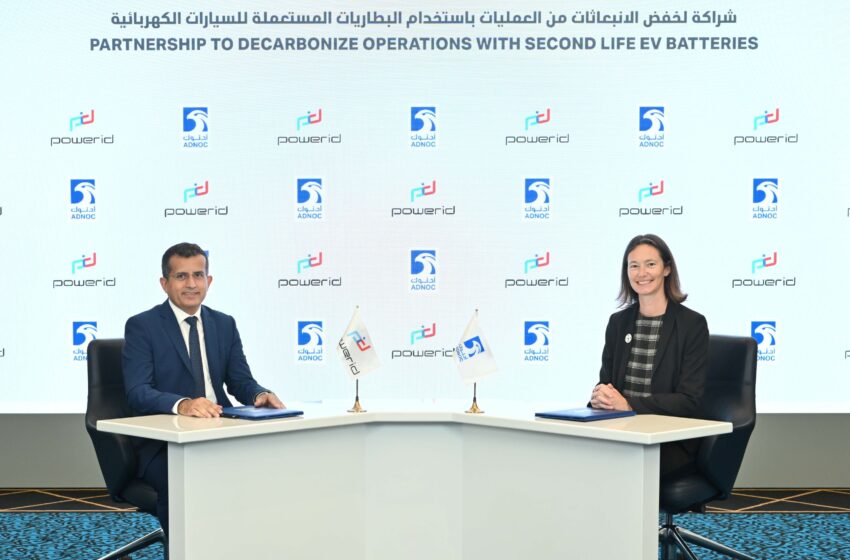
globalbizmag.com
ADNOC Inches Another Step Towards Realising NZE Target by 2045
Moving another step close to achieving its net zero emissions target by 2045, the Abu National Oil Company (ADNOC) is to trial the use of repurposed electric vehicle (EV) batteries to decarbonise its remote production operations and reduce costs.
The pilot project, run in partnership with German startup Power I.D., will see EV batteries deployed that would have otherwise been disposed of and assembled into a large-scale Battery Energy Storage System. The partnership was signed between the two companies on Wednesday.
The system, which will be built in the UAE, can hold up to two megawatts (MW) of power within a single 20-foot storage container. Each container will be mobile, allowing for deployment to remote sites.
The Battery Energy Storage System will reduce reliance on diesel generators to power remote drilling rigs. It is estimated the system will cut the carbon emissions of remote drilling rigs by up to 25% and reduce their energy expenditure by 50%.
To support the long-term development and deployment of Battery Energy Storage Systems, ADNOC has established the UAE’s first Battery Centre of Excellence. Located at the ADNOC Research and Innovation Centre (ADRIC), it will spearhead research into promising new cell technologies and future battery energy systems.
Cutting Edge Innovation
Sophie Hildebrand, ADNOC Chief Technology Officer, said that leveraging innovative technology and partnerships is a key pillar in ADNOC’s strategy to achieve net zero emissions by 2045. The Battery Energy Storage System is a cutting-edge innovation that will enhance efficiency and allow us to continue decarbonising our operations, she added.
The Battery Energy Storage System utilises advanced electric vehicle technology. It comprises 24 second life electric vehicle batteries joined together using silicon carbide convertors.
Each system contains a combination of high performance and high energy cells to provide rig operators with dynamic and versatile power output and uses disruptive liquid cooling technology, instead of conventional methods, to enhance efficiency and lifespan. An autonomous control system ensures optimal energy management.
Naser Abu Daqqa, Founder and Managing Director, Power I.D., said that the Battery Energy Storage System is unique for its high energy density.
“Together with ADNOC we have developed a system that packs in two megawatts per hour within a 20-foot container. The compact nature of the system will allow for convenient deployment to remote locations, helping ADNOC to cut emissions from its off-grid production activities,” Abu Daqqa added.
ADNOC is accelerating the decarbonisation of its operations as it reduces the carbon intensity of its operations by 25% by 2030. Its decarbonisation plan is backed by an initial allocation of $15 billion towards low-carbon solutions, new energies, and climate technologies.
Recycling EV Batteries
Recycling EV batteries plays a crucial role in minimising environmental impact and conserving valuable resources. However, EV battery recycling is not without its challenges, leading to a high number of batteries getting discarded.
Despite the fact that up to 95% of lithium-ion batteries can be retrieved, only 5% of EV batteries are currently being recycled. This creates environmental concerns and potential resource wastage. To address these challenges and create a sustainable EV battery recycling loop, the automotive industry is actively looking for innovative solutions that could give EV batteries a second life.















